Seventh Lecture under Series on Indian Constitution On International Human Rights, Norms for the Protection of Minorities and the Indian Constitution
June 07, 2014 at IOS Conference Hall

Delivering the Seventh Lecture under the series on the Indian Constitution on ‘International Human Rights, Norms for the Protection of Minorities and the Indian Constitution’, organised by the Institute of Objective Studies (IOS) here on June 7, 2014, the Associate Professor, Faculty of Law, Jamia Millia Islamia, Dr. Eqbal Hussain observed that the human rights were the articulation of the need for justice, tolerance, mutual respect and human dignity in all of our activities. He said that the traditional first generation rights were incorporated as fundamental rights in part-III and the second generation human rights were included as directive principles of state policy in part-IV of the Indian Constitution.
Commenting on the new Union Minister for Minority Affairs, Mrs. Najma Heptullah’s statement soon after assuming office that Muslims could not be treated as minorities as they were the second largest majority in India, Dr. Hussain said that the word minority was alien to the dictionary of the RSS. He argued that the issues relating to the minorities rights were extensively discussed in the Constituent Assembly, particularly by Dr. B R Ambedkar, Dr. S Radhakrishan and D E Smith, and the term ‘minority’ and secular state were interpreted.
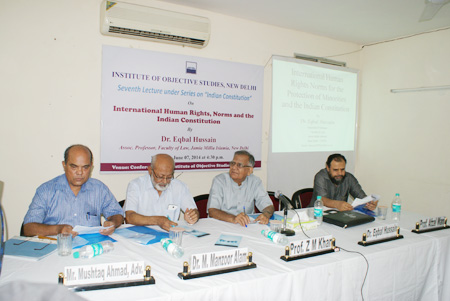
He buttressed his point by saying that Articles 25 to 30 were incorporated in the Indian Constitution to confer the rights of the freedom of religion and cultural and educational right on the minorities. He maintained that the concern of international community about the treatment of minorities was based on the premise that the international protection of the rights of the minorities was an essential aspect of the international protection of human rights. In this connection, he referred to the UN Declaration on Minorities in 1992. In order to implement it, documents like the UN Declaration on the Rights of Persons Belonging to National Ethnic, Religious and Linguistic Minorities (1992), Recommendations for UN Declaration on Minorities and Implementing UN Declaration on Minorities, were prepared.
Dr. Hussain pointed out that the question of fundamental human rights had been relevant ever since the rudimentary structure of human society came to be established. Tracing the modern concept of human rights, he said that the Second World War (1939-1945), in which both human and natural rights of the people of the world had been trampled in no uncertain manner, caused the world community to think of establishing a collective mechanism by which such cataclysms could be prevented in future.
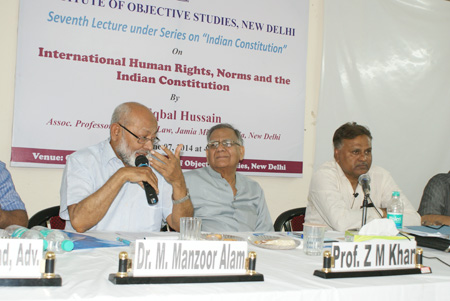
This resulted in one of the most momentous events of world history with the formation of the United Nations in 1945 and the publication of the United Nations Charter. This was also a turning point in the human rights vis-a-vis international law, he remarked. He held that the Universal Declaration of Human Rights (UDHR) was adopted by the United Nations General Assembly, on December 10, 1948, partly in response to the atrocities committed during the Second World War. As a follow-up, two international covenants – (i) Economic, Social and Cultural Rights (ICESCR) and (ii) Civil and Political Rights (ICCPR), were signed in 1966 to give effect to the UDHR, he concluded.
Senior advocate of the Supreme Court, Mr. Mushtaq Ahmad, who conducted the proceedings, opined that human rights were essential for human existence. He advised the minorities, particularly the Muslims, not to over-react to the utterances of others. He said that legal recourse was always available to aggrieved persons to approach the lower court in the first instance against the violation of human rights guaranteed under the Constitution. One could also knock at the door of the apex court in such cases.
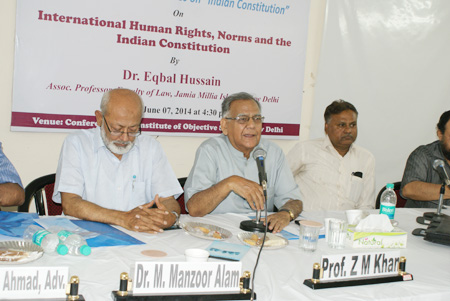
The Chairman of IOS, Dr. M. Manzoor Alam, said that the Supreme Court had ruled as far back as 1997 that the basic structure of the Constitution could not be changed. Since the rights of religious and linguistic minorities formed part of the fundamental structure of the Constitution, they were also inviolable. He noted that 50 percent vacancies of judges in various high courts and the Supreme Court were likely to come along in the near future, and if these vacancies were filled with people who had a tilt towards a particular ideology, the principles of equality, justice and liberty enshrined in the Constitution could become a casualty.
Complaining that the rights of the minorities had been systematically violated, he sought to know if an Indian citizen could directly approach the International Court of Justice at the Hague as an aggrieved party. Painting the prevailing situation as fluid, he recalled Justice Rajinder Sachar’s recent statement in which he stated that “those who opposed freedom struggle are ruling the country today.” It was a moot question if the voices being raised on various issues concerning Muslims in different corners were aimed at provoking them. He pointed out that the choice was between provocation and an agenda for development.
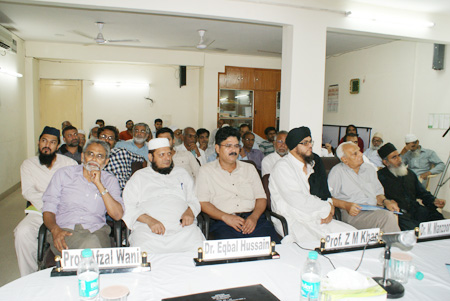
Assistant Secretary-General of the IOS and the professor of Law at the Gurugobind Singh Indraprastha University, Prof. M Afzal Wani, opined that legally the basic structure of the Constitution could not be changed. He quoted several constitutional experts like Nani Palkhiwala, Soli Sorabjee, etc., in this connection. He suggested that the IOS should collect reports on human rights and work on them.
Secretary General of the IOS, Prof. Z M Khan, in his presidential remarks said that it hardly needed to be explained that Muslims were being selectively targeted. Indiscriminate violation of their rights had created a fear psychosis in them.
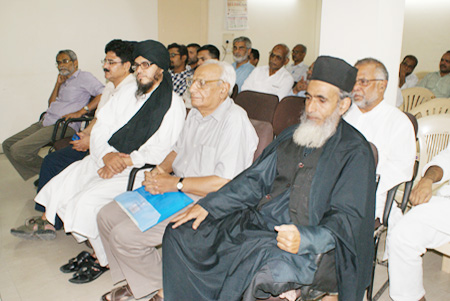
Muslim boys feared to freely talk to their fellows. He said that though the country was secular, it was being communalised. If this trend was allowed to continue, Muslims would be isolated. He was all praise for the letter and spirit of the Constitution, but lamented that its execution was hardly up to mark. He advised that the power of vote should be consciously used to have a say in governance. He regretted that we had made a cosy corner for ourselves to live in. Unless we reached an arrangement with the Scheduled Castes/Scheduled Tribes, OBCs and other marginalised sections in the electoral politics, we could not sustain them.
The lecture was attended by Prof. Refaqat Ali Khan, Vice-Chairman of the IOS Mr. E M Abdul Rahman from Kochi (Kerala), Syed Mustafa Rifai Nadvi and Syed Baqar Arshad Qasim from Bangalore, Mr. Shaikh Nizamuddin from Sholapur, Mirza Zaki Beg, Mr. Muzaffar Husain Ghazali, Mr. Raju Mansukhani, Mr. Arun Dayal, several academics social activists and prominent citizens.
Go Back